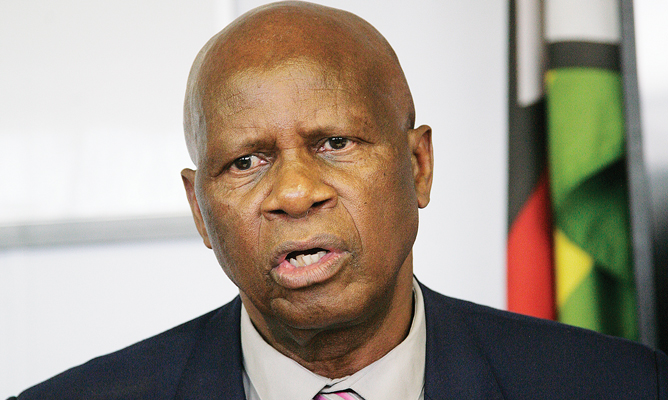
The government could soon retrench thousands of soldiers and police officers, as authorities embark on a staff audit of the security sector as part of efforts to reduce the civil service’s unsustainable wage bill.
BY VENERANDA LANGA
Finance minister Patrick Chinamasa told Parliament on Wednesday the rationalisation exercise was now being extended to the army barracks and police stations to ascertain their numbers.
“We took a decision at Cabinet to do the audit and I think the only remaining ministry to do a staff audit was Foreign Affairs because most of their staff is outside the country,” he said.
“We are now going to proceed to do an audit of the police and army as a first step towards rationalisation.”
Zimbabwe is estimated to have over 40 000 soldiers, while the police force has about 55 000 officers.
Chinamasa did not say how many police officers would be affected by the rationalisation exercise.
On Monday, Home Affairs ministry permanent secretary Melusi Matshiya told the Parliamentary Portfolio Committee on Home Affairs that police officers made up a sizeable chunk of the civil service.
- Chamisa under fire over US$120K donation
- Mavhunga puts DeMbare into Chibuku quarterfinals
- Pension funds bet on Cabora Bassa oilfields
- Councils defy govt fire tender directive
Keep Reading
The Zimbabwe Republic Police also announced recently that a headcount had begun.

In the National Assembly, Chinamasa was grilled by opposition legislators for choosing to call the exercise rationalisation instead of a retrenchment programme.
MDC legislator Priscilla Misihairabwi-Mushonga (Proportional Representation) said Chinamasa wanted to be “politically correct” to the extent he refrained from saying the government was retrenching.
“So, instead of him (Chinamasa) coming out very openly and saying, ‘what I am saying here is that there is going to be the retrenchment of civil servants’, he comes in and says that there is going to be a rationalisation of civil servants,” she said.
“It does not say anything. Just say what you think is economically okay, even if politically it will put you in soup.
“I can understand where he is coming from. There is a time that he said that there is not going to be any bonus and he was burnt fingers, head and everything else you can think of. So, I am sure in doing this budget he was sitting there and saying, ‘if again I say there has to be a retrenchment of civil servants, there is going to be somebody at some meeting who is going to say I am not going to do this’.”
Misihairabwi-Mushonga was referring to Chinamasa’s dressing-down by President Robert Mugabe after he said the government had suspended paying bonuses angering his boss, who said Cabinet had not made such a directive.
“The problem with that, Madam Speaker, is that it does not give us something proper to debate because if he had said I am going to retrench civil servants, we from both sides of the House would be saying: What will be the percentage? What are you going to do to make sure that you are not violating the labour regulations? Now, we cannot even debate that because you have left us hanging by saying you are going to rationalise and yet we know retrenchment is the biggest issue that is around it,” Misihairabwi-Mushonga said.
Chinamasa said public service retrenchments would save $14,2 million monthly and $170,4 million a year.
During his 2016 National Budget statement, he said there was need to rationalise the civil service because the number of government workers had ballooned from 203 362 in February 2009 to 276 163 by December 2014, a 35,8% growth.
Government also ordered a freeze in employment by the civil service.
Its failure to pay pensioners timeously has resulted in a decision to reintroduce employee pension contributions at a rate of 7,5% from December 1 to ensure employers and employees contribute to pensions.











